Advances in rationally engineered cytokines for precision therapy in diabetic wound healing
Diabetic wound healing presents a unique and complex challenge due to the impaired cellular and molecular functions associated with diabetes. Chronic wounds in diabetic patients are characterized by
[...] Read more.
Diabetic wound healing presents a unique and complex challenge due to the impaired cellular and molecular functions associated with diabetes. Chronic wounds in diabetic patients are characterized by prolonged inflammation, reduced angiogenesis, and impaired collagen deposition, which significantly hinder the healing process. This comprehensive review focuses on the innovative applications of designer cytokines in precision therapy for diabetic wound healing, emphasizing the remarkable advancements made in overcoming the limitations of natural cytokines, such as their short half-life, potential cytotoxicity, and lack of specificity. We begin by detailing the intricate biological characteristics of diabetic wounds and the essential role that cytokines play in orchestrating the healing process. The review critically examines the constraints of natural cytokines and traces the evolution of synthetic alternatives, with a particular emphasis on peptide-based and nucleic acid-based artificial cytokines. Advanced strategies for designing these artificial cytokines are discussed, including molecular modifications, functional enhancements, and specificity improvements to better target pathological conditions in diabetic wounds. Furthermore, we explore the utilization of synthetic biology techniques to engineer effective cytokine-based therapies. The promising therapeutic potential of rationally designed cytokines is highlighted, showcasing their ability to modulate the wound microenvironment, enhance tissue regeneration, and reduce chronic inflammation. This review not only provides valuable perspectives on the future research directions but also offers insights into the potential clinical applications of these innovative therapies, aiming to significantly improve the outcomes for patients suffering from diabetic wounds.
Xinxin Zhang ... Hong-Hui Wang
View:936
Download:30
Times Cited: 0
Diabetic wound healing presents a unique and complex challenge due to the impaired cellular and molecular functions associated with diabetes. Chronic wounds in diabetic patients are characterized by prolonged inflammation, reduced angiogenesis, and impaired collagen deposition, which significantly hinder the healing process. This comprehensive review focuses on the innovative applications of designer cytokines in precision therapy for diabetic wound healing, emphasizing the remarkable advancements made in overcoming the limitations of natural cytokines, such as their short half-life, potential cytotoxicity, and lack of specificity. We begin by detailing the intricate biological characteristics of diabetic wounds and the essential role that cytokines play in orchestrating the healing process. The review critically examines the constraints of natural cytokines and traces the evolution of synthetic alternatives, with a particular emphasis on peptide-based and nucleic acid-based artificial cytokines. Advanced strategies for designing these artificial cytokines are discussed, including molecular modifications, functional enhancements, and specificity improvements to better target pathological conditions in diabetic wounds. Furthermore, we explore the utilization of synthetic biology techniques to engineer effective cytokine-based therapies. The promising therapeutic potential of rationally designed cytokines is highlighted, showcasing their ability to modulate the wound microenvironment, enhance tissue regeneration, and reduce chronic inflammation. This review not only provides valuable perspectives on the future research directions but also offers insights into the potential clinical applications of these innovative therapies, aiming to significantly improve the outcomes for patients suffering from diabetic wounds.
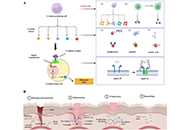 Advances in rationally engineered cytokines for precision therapy in diabetic wound healingOpen AccessReviewDiabetic wound healing presents a unique and complex challenge due to the impaired cellular and molecular functions associated with diabetes. Chronic wounds in diabetic patients are characterized by [...] Read more.Xinxin Zhang ... Hong-Hui WangPublished: August 28, 2024 Explor Immunol. 2024;4:533–553
Advances in rationally engineered cytokines for precision therapy in diabetic wound healingOpen AccessReviewDiabetic wound healing presents a unique and complex challenge due to the impaired cellular and molecular functions associated with diabetes. Chronic wounds in diabetic patients are characterized by [...] Read more.Xinxin Zhang ... Hong-Hui WangPublished: August 28, 2024 Explor Immunol. 2024;4:533–553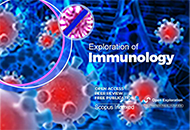 Evolving role of immunology in chronic pain medicine: tissue necrosis factor and interleukin modulatory treatmentsOpen AccessMini ReviewOur immune system acts to protect us in times of stress and traumatic injury. As part of the immune response, the body produces various cytokines, which mediate or modulate immune functions. Such cy [...] Read more.Rucha A. Kelkar ... Giustino VarrassiPublished: August 28, 2024 Explor Immunol. 2024;4:523–532
Evolving role of immunology in chronic pain medicine: tissue necrosis factor and interleukin modulatory treatmentsOpen AccessMini ReviewOur immune system acts to protect us in times of stress and traumatic injury. As part of the immune response, the body produces various cytokines, which mediate or modulate immune functions. Such cy [...] Read more.Rucha A. Kelkar ... Giustino VarrassiPublished: August 28, 2024 Explor Immunol. 2024;4:523–532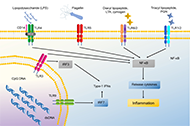 Critical role of keratinocytes in cutaneous immune responsesOpen AccessReviewKeratinocytes play an integral role in the human epidermis, serving as a barrier between the internal and external environment. They are immune-competent cells involved in both innate and adaptive c [...] Read more.Rakesh Kumar Gupta ... Dhananjay ShuklaPublished: August 27, 2024 Explor Immunol. 2024;4:502–522
Critical role of keratinocytes in cutaneous immune responsesOpen AccessReviewKeratinocytes play an integral role in the human epidermis, serving as a barrier between the internal and external environment. They are immune-competent cells involved in both innate and adaptive c [...] Read more.Rakesh Kumar Gupta ... Dhananjay ShuklaPublished: August 27, 2024 Explor Immunol. 2024;4:502–522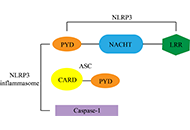 Research progress on NLRP3 inflammasomes in male reproductive immunityOpen AccessReviewThe male reproductive immune system plays a pivotal role in safeguarding sperm from immune attacks and preventing the incursion of foreign pathogens. Nucleotide-binding and oligomerization domain-li [...] Read more.Xue Zhang ... Donghui HuangPublished: August 22, 2024 Explor Immunol. 2024;4:490–501
Research progress on NLRP3 inflammasomes in male reproductive immunityOpen AccessReviewThe male reproductive immune system plays a pivotal role in safeguarding sperm from immune attacks and preventing the incursion of foreign pathogens. Nucleotide-binding and oligomerization domain-li [...] Read more.Xue Zhang ... Donghui HuangPublished: August 22, 2024 Explor Immunol. 2024;4:490–501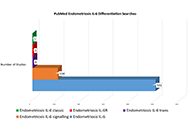 IL-6 signaling pathway differentiation for endometriosis and inflammatory diseasesOpen AccessReviewInterleukin-6 (IL-6) plays a critical role in the pathogenesis of various chronic inflammatory diseases, tracked across numerous fields of research. Despite this, a crucial aspect often overlooked i [...] Read more.Ryan D. CastlePublished: August 20, 2024 Explor Immunol. 2024;4:476–489
IL-6 signaling pathway differentiation for endometriosis and inflammatory diseasesOpen AccessReviewInterleukin-6 (IL-6) plays a critical role in the pathogenesis of various chronic inflammatory diseases, tracked across numerous fields of research. Despite this, a crucial aspect often overlooked i [...] Read more.Ryan D. CastlePublished: August 20, 2024 Explor Immunol. 2024;4:476–489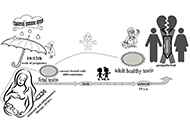 Healthy functioning mammal male reproductive system is determined during prenatal development: long-term consequences of maternal immune activationOpen AccessReviewThe reproductive axis of male mammals implies a coordinated interaction of its three components: a population of gonadotropin-releasing hormone (GnRH)—producing neurons of the hypothalamus, gonado [...] Read more.Marina IzvolskayaPublished: August 07, 2024 Explor Immunol. 2024;4:465–475
Healthy functioning mammal male reproductive system is determined during prenatal development: long-term consequences of maternal immune activationOpen AccessReviewThe reproductive axis of male mammals implies a coordinated interaction of its three components: a population of gonadotropin-releasing hormone (GnRH)—producing neurons of the hypothalamus, gonado [...] Read more.Marina IzvolskayaPublished: August 07, 2024 Explor Immunol. 2024;4:465–475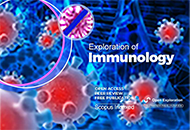 Testicular inflammation in male reproductive systemOpen AccessReviewThe control of the immune system, neuroendocrine system, and energy metabolism is essential for the physiological process of male reproduction. The hypothalamic-pituitary-testicular (HPT) axis regul [...] Read more.Prity Yadav, Pratap Chand MaliPublished: August 05, 2024 Explor Immunol. 2024;4:446–464
Testicular inflammation in male reproductive systemOpen AccessReviewThe control of the immune system, neuroendocrine system, and energy metabolism is essential for the physiological process of male reproduction. The hypothalamic-pituitary-testicular (HPT) axis regul [...] Read more.Prity Yadav, Pratap Chand MaliPublished: August 05, 2024 Explor Immunol. 2024;4:446–464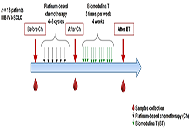 Assessment of non-classical lymphocyte populations in patients with advanced lung cancer treated with Biomodulina T following platinum-based chemotherapyOpen AccessOriginal ArticleAim: Currently, malignant diseases represent a health issue worldwide. Among these, lung cancer is of growing importance, due to its high incidence and mortality. Chemotherapy, one of the most fr [...] Read more.Gisela María Suárez ... Danay SaavedraPublished: August 05, 2024 Explor Immunol. 2024;4:433–445
Assessment of non-classical lymphocyte populations in patients with advanced lung cancer treated with Biomodulina T following platinum-based chemotherapyOpen AccessOriginal ArticleAim: Currently, malignant diseases represent a health issue worldwide. Among these, lung cancer is of growing importance, due to its high incidence and mortality. Chemotherapy, one of the most fr [...] Read more.Gisela María Suárez ... Danay SaavedraPublished: August 05, 2024 Explor Immunol. 2024;4:433–445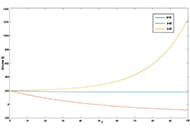 Exploring the impact of immune response on tumor heterogeneity through mathematical modelingOpen AccessOriginal ArticleAim: This article presents an investigation into various mathematical models for cell population growth, including tumor cells, and their dynamics. Methods: We classify the models into five [...] Read more.Diksha Gautam ... Deepshikha DixitPublished: July 18, 2024 Explor Immunol. 2024;4:414–432
Exploring the impact of immune response on tumor heterogeneity through mathematical modelingOpen AccessOriginal ArticleAim: This article presents an investigation into various mathematical models for cell population growth, including tumor cells, and their dynamics. Methods: We classify the models into five [...] Read more.Diksha Gautam ... Deepshikha DixitPublished: July 18, 2024 Explor Immunol. 2024;4:414–432